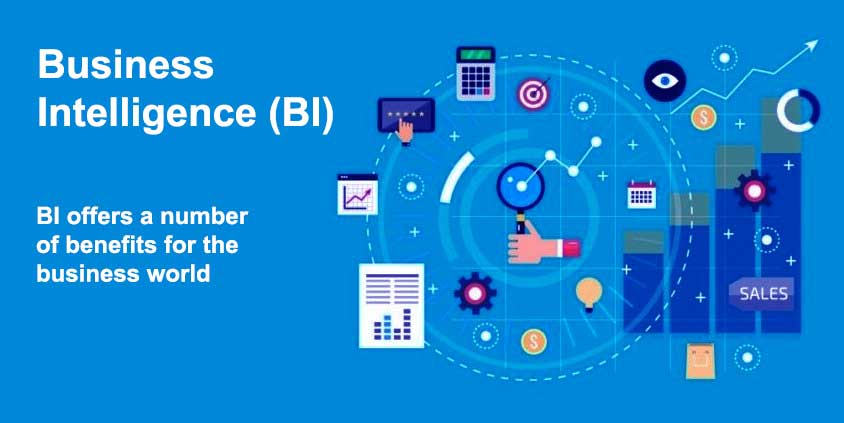Business Intelligence (BI)
Business Intelligence (BI) refers to the processes, technologies, and tools used by organizations to analyze and interpret their data, enabling informed decision-making and strategic planning. BI encompasses a wide range of activities, including data collection, analysis, visualization, and reporting, with the goal of providing actionable insights to stakeholders across the organization. Here are the key components and benefits of business intelligence:

Components of Business Intelligence:
- Data Sources: BI relies on various data sources, including internal systems (such as enterprise resource planning (ERP) and customer relationship management (CRM) systems), external databases, spreadsheets, and cloud-based applications.
- Data Warehousing: Data warehouses are central repositories that store and organize data from multiple sources in a structured format, making it easier to access and analyze.
- Data Integration: BI tools integrate data from disparate sources, transforming and consolidating it into a unified format for analysis. This process involves data cleansing, transformation, and loading (ETL).
- Data Analysis: BI platforms use analytical techniques such as querying, data mining, statistical analysis, and machine learning to uncover patterns, trends, and insights within the data.
- Data Visualization: Visualizations such as charts, graphs, and dashboards are used to present complex data in a clear and understandable format, enabling stakeholders to quickly grasp key insights.
- Reporting and Dashboards: BI tools generate reports and dashboards that provide stakeholders with real-time access to relevant data and KPIs, facilitating data-driven decision-making.
Benefits of Business Intelligence:
- Informed Decision-Making: BI enables organizations to make data-driven decisions based on insights derived from comprehensive data analysis.
- Improved Operational Efficiency: By providing visibility into key metrics and performance indicators, BI helps organizations identify inefficiencies and streamline processes.
- Enhanced Customer Insights: BI allows organizations to analyze customer data and behavior, enabling personalized marketing campaigns, improved customer service, and enhanced customer satisfaction.
- Strategic Planning: BI helps organizations identify market trends, opportunities, and threats, enabling strategic planning and informed business strategies.
- Increased Revenue and Cost Savings: By optimizing operations, identifying new revenue opportunities, and reducing costs, BI contributes to overall business growth and profitability.
- Compliance and Risk Management: BI helps organizations monitor regulatory compliance, identify risks, and mitigate potential threats by providing insights into areas such as fraud detection, security breaches, and financial anomalies.
Conclusion:
Business Intelligence plays a critical role in helping organizations leverage their data to gain insights, make informed decisions, and achieve their strategic objectives. By implementing BI processes, technologies, and tools, organizations can unlock the full potential of their data and gain a competitive edge in today’s data-driven business environment.